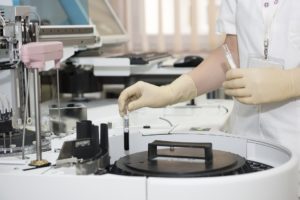The National Innovation Agency (public organization) or NIA, has continuously driven the development of the Yothi Medical Innovation District (YMID) to respond to the needs of the country and to create a central medical hub in Asia. It aims to reduce imports of medical innovations from foreign countries and to establish a Thai medical innovation
The National Innovation Agency (public organization) or NIA, has continuously driven the development of the Yothi Medical Innovation District (YMID) to respond to the needs of the country and to create a central medical hub in Asia. It aims to reduce imports of medical innovations from foreign countries and to establish a Thai medical innovation brand. Currently, there are over 163 supported projects within the district, including the bed sharing systems for patient transfers between hospitals, 11-billion-baht investments in scientific research, technology and innovation from establishment of the Medical Innovations Development Center (MIND CENTER), adaptable co-working, along with a Clinical Research Center for managing clinical research including expanding services for an increasing number of patients. All of these are in the new Ramathibodi Hospital building. Additionally, the Board of Investment (BOI) has implemented measures to stimulate investment, and currently, three innovative businesses have applied to qualify for benefits within the investment promotion zone.

Dr. Pun-arj Chairatana, Executive Director of the National Innovation Agency (Public Organization) or NIA, said that the global COVID-19 pandemic has led to dramatically changes in the healthcare and medical technology situations. The demand for medical and healthcare solutions has increased exponentially, transforming the industry into an important sector worldwide as it benefits both social and economic dimensions. This trend has been observed in Thailand which has been ambitious in building a medical hub in the Asian region.
Apart from attracting investments, this initiative aims to create job opportunities and provide linkages to related businesses by focusing on driving in 4 key areas: 1) Medical Service Center, 2) Health Service Center, 3) Pharmaceutical and Health Product Center and 4) Academic and Research Service Center, he said.
Dr. Pun-Arj added that for more than 5 years the NIA has been supporting the “Yothi Medical Innovation District (YMID)” as an area conducive to education, research, and medical innovations in the country. This initiative aims to foster effective collaboration among government, private sector, startups, innovative entrepreneurs, and investors. YMID has become a highly successful model for innovation development, showcasing advancements in this and in both development and network connectivity within the area, circulating investment capital, and with the implementation of a bed-sharing system across healthcare facilities to accommodate patients in vulnerable groups.

This is operated by a group of hospitals within the YMID, such as Ramathibodi Hospital, Rajavithi Hospital and Phramongkutklao Hospital. The working model is a data-sharing model that facilitates patient transfers to hospitals equipped to provide appropriate treatment based on their conditions. This system caters to different patient groups, including those requiring immediate care, post-operative recovery, or who are undergoing diagnostic processes, thereby enhancing the efficiency, speed and convenience of healthcare management, he said.
NIA has supported startups and innovative businesses to benefit hospitals and public sectors about 7 projects, such as the Knock-down Airborne Infection Isolation Room (AIIR) and Smart Pulz, a remote heart rate and vital signs monitoring device. These initiatives have significantly reduced the risk of infection among medical personnel, he added.
In addition, this also supports the use of a science, technology and innovation infrastructure in 3 co-working spaces, 36 laboratories, 27 research/technology centers, and 2 startup incubators in the field of health and medicine. Also, the BOI’s approved investment measures designating the YMID as an investment promotion zone, aiming to support Thailand in becoming a central hub for medical innovation and research. These measures support the development of human resources, innovation, and technology exchange, particularly deep technology between businesses and public institutions such as educational institutions, hospitals, medical institutes, and research institutions, said Dr Pun-Arj.
“These measures offer a 50% reduction in corporate income tax for a period of 5 years, top up from normal benefits. Currently, 3 innovative businesses have already been granted benefits within the investment promotion zone, with a focus on 11 specific sectors, including electronic design, software development platforms for digital content, innovation incubators, maker spaces, research and development businesses, biotechnology businesses, engineering design services, scientific testing services, standard calibration services in vocational training institution businesses and for clinical research, covering both Thai and foreign entrepreneurs.”
Dr. Pun-Arj added that in 2022, NIA had evaluated the worthiness of the Yothi Medical Innovation District project and found that within a year, 30 new SMEs and startups had been created in the area, generating a network of 150 innovators, while 20 projects had been supported in the area while there were 7 projects that had been developed for innovative research which could create an economic value of 103 million baht. The projects’ worth is 5 times the value of the investment which is the result of working together, both in research support and network development within the district along with investment support. The Yothi district is also the area with the most medical personnel in the country.
“Being the initiator of the Yothi Medical Innovation District, NIA does not only aim to create a conducive environment for innovation investment but also aspires to reduce Thailand’s dependence on imported medical innovations. It aims to provide Thais with access to medical services through advanced Thai deep-tech brands that are accurate and efficient. This initiative aims to alleviate the burden on healthcare professionals and to address emerging complex diseases. Furthermore, it sets the path towards new medical innovation trends such as digital health, telemedicine, carbon reduction in the healthcare industry and in enabling access to advanced medical treatments at an accessible price for the Thai population,” he said.

